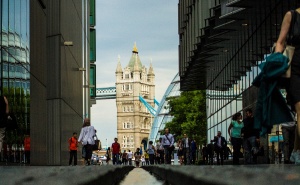UK economy rated below Zimbabwe. Is Cameron bringing home the bacon? – Guest Editorial
By Paul Orford, VP Business Development, TopFX Since their victory in the 2010 UK general election, Prime Minister David Cameron and his Chancellor George Osborne, have made continual claims that their austerity based economic policies are continually making a stronger economy. With his recent attacks upon the new opposition Labour leader Jeremy Corbyn, they call […]

By Paul Orford, VP Business Development, TopFX
Since their victory in the 2010 UK general election, Prime Minister David Cameron and his Chancellor George Osborne, have made continual claims that their austerity based economic policies are continually making a stronger economy.
With his recent attacks upon the new opposition Labour leader Jeremy Corbyn, they call into question both his party and his economic nous. However, a new report by the World Economic Forum argues there are parts of the UK economy are now performing worse than Haiti and Zimbabwe.
When Cameron was elected leader of the Conservatives, he argued that ‘we should let the sunshine in’. Was he arguing that we should be following the economic policy of these sun drenched countries?
The Global Competitiveness Survey is released by the World Economic Forum every year, and is considered to be a major report that is read and used as reference by decision makers in both the world of politics and business.
Having slipped from 9th to 10th position out of the 140 countries analysed, is it right that the pair can claim that the UK economy is growing at the fastest rate in the developed world when it is falling down the league table.
The answer for many is the tremendous debt that the UK carries. When assessed under the criteria of ‘macroeconomic environment’ the Uk falls behind such economic power houses as Haiti, Senegal, Zimbabwe and Liberia.
An explanation of the macroeconomic environment would be that of taking a longer term view of the structures and challenges that the country faces. In this case, the report focuses on five factors which helps us develop a picture.
Inflation. 1st out of 140 countries.
Country credit rating. 14th of 140 countries.
Government budget balance. 118th of 140 countries.
Gross national savings. 118 of 140 countries.
General government debt 123rd of 140 countries.
With both Cameron and Osborne claiming to have the UK economy on the correct path, and one of the most respected studies claiming that the UK ranks alongside war torn Liberia and Zimbabwe, which offers the more balanced view?

One problem that the government does have is that the macroeconomic view is not favourable for them. Without the investment in infrastructure over the past five years, they cannot develop the argument that there will be a better future once their investments in infrastructure come to fruition.
A great analogy I read recently compared their austerity model with 2 neighbours living in wooden houses. The first one buys a boiler and heating system knowing that it will cost money, but will ultimately pay off in the future. The second burns everything he owns to keep warm and save money!
The question that needs to be asked is what happens when the second house has to be sold to a new owner? This shell of a house would be a great representation of what the countries assets would be like. Ultimately the tax payer will have to repair the damage caused by short term neo liberal policies after they have left office.
With the mounting evidence that the UK is experiencing the slowest economic recovery in its history, one of the reasons for the positive data is the Chancellor using cuts and sale of public owned assets in attempting to create a positive data. These continued actions will perhaps lead to the reduction in the potential of growth of the country.
Although the Conservatives may argue that we cannot afford to end austerity, but the truth is can we afford to continue?
This is a guest editorial which was compiled by and represents the viewpoint of Paul Orford, VP Business Development at TopFX









